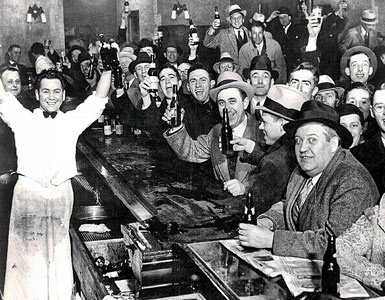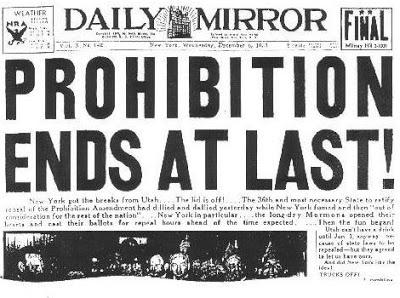Happy Repeal Day!
On December 5th, 1933, the 21st Amendment to the United States Constitution was passed and the “Great Experiment” of Prohibition was brought to an end. (The Amendment was passed by the Senate on February 16th and by the House of Representatives on Feb 20th. The law went into effect on December 5th.)
Section 1. The eighteenth article of amendment to the Constitution of the United States is hereby repealed.
Section 2. The transportation or importation into any State, Territory, or Possession of the United States for delivery or use therein of intoxicating liquors, in violation of the laws thereof, is hereby prohibited.
Section 3. This article shall be inoperative unless it shall have been ratified as an amendment to the Constitution by conventions in the several States, as provided in the Constitution, within seven years from the date of the submission hereof to the States by the Congress.
The amendment left the individual states with primary control over the sale and consumption of alcohol. The confusion over how alcohol can be sold is still hotly debated…82 years later. My home state of Pennsylvania still maintains “blue laws” (laws designed to restrict or ban some or all Sunday activities for religious reasons, particularly to promote the observance of a day of worship or rest) that limit the sale of alcohol on Sundays, though a few years ago, some stores were given permission to remain open. Pennsylvania is one of eighteen states in the United States that have a state monopoly over the wholesaling or retailing of some or all categories of alcoholic beverages, such as beer, wine, and distilled spirits. To this day, many states have dry counties- 39 of Kentucky’s 120 counties are still dry! (32 are wet and 49 are moist or dry with special circumstances) It took until 1966 for all states to repeal their statewide liquor laws with Mississippi being the last to do so.
Our nation’s history, and all it can teach us, is vital to our future. Not all of our government’s decisions are made wisely or are in the best interest of our country. The failure of Prohibition may very well have led to the Great Depression. Before Prohibition, whiskey taxes made up almost half of our nation’s tax revenue. During Prohibition, an estimated $861 million dollars was lost in federal tax revenue from untaxed liquor (illegal liquor sales), $40 million was spent on enforcement yearly (possibly $310 million overall) and $11 billion was lost in federal taxes. It crippled the whiskey industry and created monopolies that consolidated all the smaller producers. Huge illegally gained profits during the 1930’s created underground trade, mobsters and wide-spread government corruption and bribery.
In 1925, Henry Louis Mencken, a German-American journalist (known as “the Sage of Baltimore”) wrote,
“Five years of Prohibition have had, at least, this one benign effect: they have completely disposed of all the favorite arguments of the Prohibitionists. None of the great boons and usufructs that were to follow the passage of the Eighteenth Amendment has come to pass. There is not less drunkenness in the Republic, but more. There is not less crime, but more. There is not less insanity, but more. The cost of government is not smaller, but vastly greater. Respect for law has not increased, but diminished.”
(a usufruct, by the way, is the right to use or enjoy something- had to look that one up!)
I, for one, will raise a glass of freedom tonight! Here’s to whiskey! Cheers!


